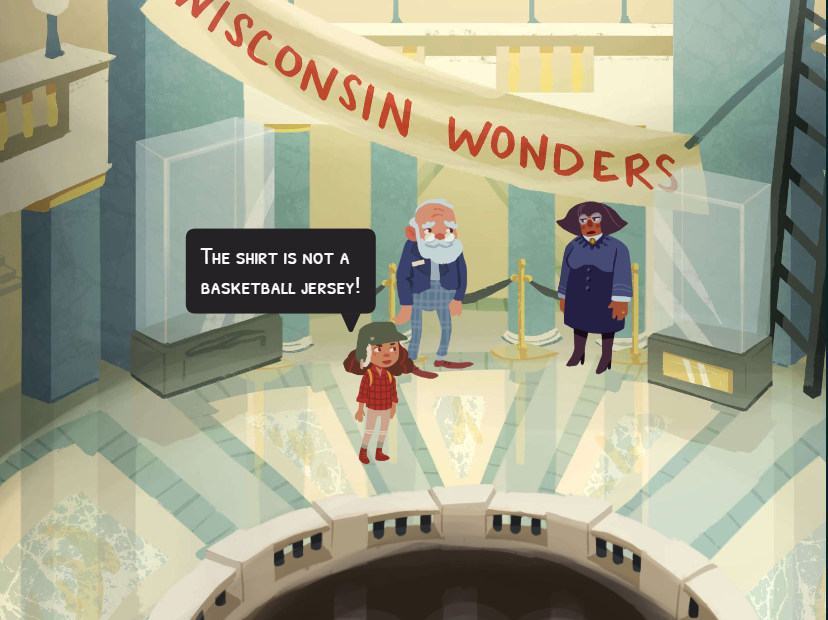Described as a “love letter to Wisconsin,” the game, Jo Wilder and the Capitol Case encompasses history, setting, and even textiles from various Wisconsin cultures to honor the Wisconsin Capitol Centennial. Through a collaboration among Wisconsin Public Television Education, University of Wisconsin’s Field Day Lab, and a cohort of elementary social studies teachers, the free online game has been tested by hundreds of students and played more than 25,000 times.
To play the game, students work through a series of challenges based on historical inquiry and entertaining storylines. Players find clues, examine evidence and primary source materials, and build their investigation just as historians must do.

Sarah Gagnon, communications and creative director for the Field Day Lab, is part of the team that created the game. After Wisconsin Public Television approached them to make a history game, her team worked through the process of narrowing down ideas, learning more about their subject, and creating the storylines and art.
Her favorite parts of the game include the art and various storylines, including a particular character. “Teddy the Badger gets kidnapped!” she said, “Eric Lang, an artist here at Field Day Lab came up with the idea of Teddy the badger. He thought that if Teddy could get kidnapped, the kids would dramatically connect with the story. We tested it with students and Teddy was the main thing the kids talked about. Teddy gives the kids something to care about right away. The interest in history gets to bloom slowly throughout the game.”
The Field Day Lab considers teachers as another set of experts and hosted three different teacher fellowships for the creation of the Jo Wilder game. Teachers from around the state participated for one to two full days, meeting experts like archivists and historians at the Wisconsin Historical Society. After the in-person days, they went back to their classrooms, met online as needed, and tested the game with their students.
George Klink, a fourth-grade teacher in the Elmwood School District said that while the game was being designed, “the experts would send portions for teachers to use online. As the project was fine-tuned, students were then encouraged to play and add their opinions on the game for possible revisions.” He appreciated Jo Wilder and the Capitol Case as a game that “helps youngsters practice what can be learned from primary and secondary sources within a vicarious experience.”
Teachers from other parts of the state agree. Kasey Rachu, a third-grade teacher at Edgar Elementary in the Edgar School District said, “This was a really fun opportunity for both myself and the students to help create a fun game! I helped other fellows find the artifacts to put into the game for Jo to find. I also conducted studies in my classroom to help get the quirks out of the game as it was being made.”
Gagnon made it clear that the teachers did not just supply feedback about the game; rather, they were co-designers who brought their classroom experience and expertise in teaching and learning. “Teachers understand what needs to get taught, what resources they have and what the kids are like,” Gagnon said. “We hope to make future levels of the Jo Wilder game. The teachers have given us a lot of great ideas for these future levels!”
Collaboration with teachers proved integral to the success of the game. Boyd Roessler served as a fellow for two different phases of development. As a fourth-grade teacher for Hillcrest Elementary School in the Waukesha School District, he supported the initial development of the conceptual framework as well as design of the game’s interactive history.
As part of the second phase, Boyd said, “I was able to collaborate with a team that planned and designed lessons and units for 3rd, 4th, and 5th grade classes that integrated Jo Wilder and the Capitol Case into our social studies curriculums. We met as a group and shared ideas and discussed plans and resources. Along with the other teachers, I have planned and implemented utilizing a Jo Wilder unit with my class.”
Classroom resources and standards alignment information is available on the Jo Wilder and the Capitol Case website. Field Day Lab hosts teacher fellowships 4-6 times each year and offers stipends to participating teachers. They also have many other free, high-quality games and online resources to explore.
For more information, and for educators interested in connecting with Field Day through one of their many fellowships, visit the Field Day is for Teachers page.